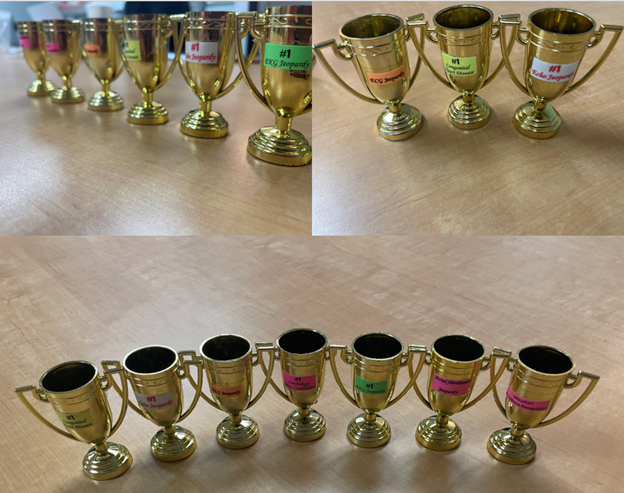Gamification in Medical Education: Let the Games Begin!
The familiar music leads us to the moderator reading the first answer: "The most common genetic mutation associated with Brugada Syndrome."
Team A promptly jumps for the buzzer "What is SCN5A?"
Moderator: "That is correct! 200 points to Team A."
Over the years, medical education has morphed from unidirectional lectures to many shapes and forms. One of the key drivers in medical education is the delivery method, which now involves fun and digestible ways to present complex information. That is where "Jeopardy" comes into play.

The Jeopardy game began in 1964, when it first aired on TV. It was first integrated into medicine during the annual Florida Chapter meeting of the American College of Physicians (ACP) in 1994 and was renamed "Doctor's Dilemma." As it gained popularity year after year, several other chapters, such as the Atlanta Chapter, adopted the game. In 2006, a championship trophy named "the Osler Cup" was created to be awarded to the winning team of the ACP Doctor's Dilemma competition annually. The ACC adopted the game in the early 2000s and named it "The Battle of the State Chapters."
As the years have passed, the game has evolved into a more sophisticated experience, with multiple rounds and nationwide participation. Each chapter competes for the winning team to then proceed to the national competition during ACC's Annual Scientific Session, where almost 40 states participated this past year for the title, the trophy and of course, bragging rights. The game spans across different disciplines in cardiology, including congenital heart disease, echocardiography, electrophysiology and more. During the COVID-19 pandemic, the game prevailed in the virtual realm with an online buzzer system and immense coordination from the organizers.
I personally began participating in medical Jeopardy during my Internal Medicine residency training. While training can be rigorous and stressful, engaging in Jeopardy introduced an enjoyable and stress-relieving dimension to the learning process, offering the opportunity to learn new concepts and materials with each session. At the University of South Alabama Cardiology division where I train, every Friday morning, we start our day with a friendly game of Cardiology Jeopardy between fellows, where we compete for the rolling trophy (Figure) and the title for the week. For us, medical Jeopardy creates a friendly environment for fellows to compete and learn together. It serves as an interactive method of learning and reviewing knowledge in the field of cardiology.
This article was authored by Mariam A. Riad, MD, a general cardiology fellow at University of South Alabama, AL.
This content was developed independently from the content developed for ACC.org. This content was not reviewed by the American College of Cardiology (ACC) for medical accuracy and the content is provided on an "as is" basis. Inclusion on ACC.org does not constitute a guarantee or endorsement by the ACC and ACC makes no warranty that the content is accurate, complete or error-free. The content is not a substitute for personalized medical advice and is not intended to be used as the sole basis for making individualized medical or health-related decisions. Statements or opinions expressed in this content reflect the views of the authors and do not reflect the official policy of ACC.

